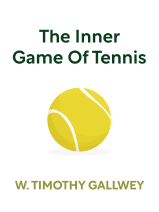

This article is an excerpt from the Shortform book guide to "The Inner Game of Tennis" by W. Timothy Gallwey. Shortform has the world's best summaries and analyses of books you should be reading.
Like this article? Sign up for a free trial here .
What are the benefits of playing tennis? Does tennis offer health benefits?
In addition to the ability to be competitive, there are many health benefits of playing tennis. Tennis can help you stay fit and teach you mental focus.
Keep reading for the health benefits of playing tennis.
Benefits of Playing Tennis
There are numerous benefits of playing tennis. In addition to health benefits, tennis can keep
Some of the main benefits of playing tennis are listed below.
Here and Now
We are focusing our awareness on the here and the now:
- The here is the ball, the wind, our own muscles or stroke.
- The now is turning our attention directly to the present. Not thinking about past points or points to come, not thinking about defeat or victory. The now is so important because it’s very easy to spiral out of control and lose our place on the court.
Being alert is basically measuring how much you can be in the “now” every second. If you’re thinking about external things, that means that less of you is able to focus on what’s happening in front of you. It’s our wish for things to be different than they are right now that pulls us from the present. Tennis becomes only part of the game that you’re playing on the court; you’re also thinking about your opponent and your friends and other matches if you’re in a tournament.
In a match, usually the competition will keep you focused during each point, so the important moment is between the points. Think about the natural rhythm of your own breathing to maintain concentration in this case.
These experiments that improve your tennis game can also improve your life—we can use our senses to focus our attention more directly on whatever we want. It becomes much easier to tune out any other background noise in our consciousness.
Health-o-Fun-o: Maintaining or improving mental or physical health and fun is one of the major benefits of playing tennis.
- The first subgame is “Health-o.”
- This is often at a doctor’s advice or part of a self-improvement kick—you are playing to relax your mind or exercise.
- The obstacles are finding someone who has similar motivations to play or doubts that tennis actually can help you.
- The second subgame is “Fun-o.”
- You don’t want to win or really get better. You just want to fool around on the court (it’s rare that this is anyone’s only motivation).
- The only obstacles are being pulled into other games.
- The third subgame is “Learn-o.”
- You are playing just to evolve and learn because you enjoy learning.
- Once again, the only obstacle is being pulled into other games.
Most “serious” tennis players are playing some version of “Good-o.” People can begin at other places, but as they commit more time and energy to the sport, they begin to do things like set standards for themselves that are impossible to live up to.
This has more to do with the way our society is constructed than anything else: Everything is achievement-oriented, so tennis has to be as well, especially because it is naturally a competition. Gallwey knows this to be true from his own childhood and how he managed to get over his will to win the match at all costs.

———End of Preview———
Like what you just read? Read the rest of the world's best book summary and analysis of W. Timothy Gallwey's "The Inner Game of Tennis" at Shortform .
Here's what you'll find in our full The Inner Game of Tennis summary :
- Why tennis is actually a mind game
- How to quiet the mind and concentrate intently
- Why your self-worth shouldn't be dependent on how you do in competition






